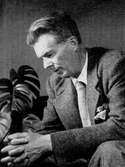Aldous Huxley Quote
With me, travelling is frankly a vice. The temptation to indulge in it is one which I find almost as hard to resist as the temptation to read promiscuously, omnivorously and without purpose. From time to time, it is true, I make a desperate resolution to mend my ways. I sketch out programmes of useful, serious reading; I try to turn my rambling voyages into systematic tours through the history of art and civilization. But without much success. After a little I relapse into my old bad ways. Deplorable weakness! I try to comfort myself with the hope that even my vices may be of some profit to me.
Aldous Huxley
With me, travelling is frankly a vice. The temptation to indulge in it is one which I find almost as hard to resist as the temptation to read promiscuously, omnivorously and without purpose. From time to time, it is true, I make a desperate resolution to mend my ways. I sketch out programmes of useful, serious reading; I try to turn my rambling voyages into systematic tours through the history of art and civilization. But without much success. After a little I relapse into my old bad ways. Deplorable weakness! I try to comfort myself with the hope that even my vices may be of some profit to me.
Related Quotes
About Aldous Huxley
Aldous Leonard Huxley ( AWL-dəs; 26 July 1894 – 22 November 1963) was an English writer and philosopher. His bibliography spans nearly 50 books, including novels and non-fiction works, as well as essays, narratives, and poems.
Born into the prominent Huxley family, he graduated from Balliol College, Oxford, with an undergraduate degree in English literature. Early in his career, he published short stories and poetry and edited the literary magazine Oxford Poetry, before going on to publish travel writing, satire, and screenplays. He spent the latter part of his life in the United States, living in Los Angeles from 1937 until his death. By the end of his life, Huxley was widely acknowledged as one of the foremost intellectuals of his time. He was nominated for the Nobel Prize in Literature nine times, and was elected Companion of Literature by the Royal Society of Literature in 1962.
Huxley was a pacifist. He grew interested in philosophical mysticism, as well as universalism, addressing these subjects in his works such as The Perennial Philosophy (1945), which illustrates commonalities between Western and Eastern mysticism, and The Doors of Perception (1954), which interprets his own psychedelic experience with mescaline. In his most famous novel Brave New World (1932) and his final novel Island (1962), he presented his visions of dystopia and utopia, respectively.
Born into the prominent Huxley family, he graduated from Balliol College, Oxford, with an undergraduate degree in English literature. Early in his career, he published short stories and poetry and edited the literary magazine Oxford Poetry, before going on to publish travel writing, satire, and screenplays. He spent the latter part of his life in the United States, living in Los Angeles from 1937 until his death. By the end of his life, Huxley was widely acknowledged as one of the foremost intellectuals of his time. He was nominated for the Nobel Prize in Literature nine times, and was elected Companion of Literature by the Royal Society of Literature in 1962.
Huxley was a pacifist. He grew interested in philosophical mysticism, as well as universalism, addressing these subjects in his works such as The Perennial Philosophy (1945), which illustrates commonalities between Western and Eastern mysticism, and The Doors of Perception (1954), which interprets his own psychedelic experience with mescaline. In his most famous novel Brave New World (1932) and his final novel Island (1962), he presented his visions of dystopia and utopia, respectively.
